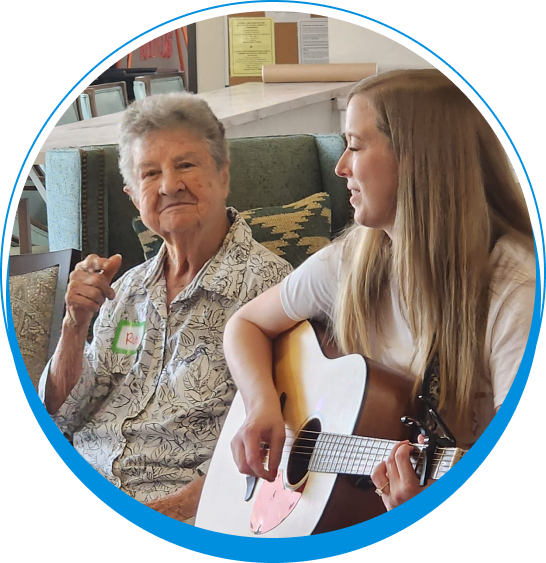You or your loved one recently received a dementia diagnosis, and now you need to find community resources for dementia care services – fast.
From websites and online resources to community organizations that specialize in dementia care and family support, there are many places to go to get information about dementia and your next steps.
“It’s easy to be overwhelmed when you or your loved one receives a dementia diagnosis,” said Jaime Cobb Tinsley, vice president for education at the James L. West Center for Dementia Care. “Eventually, you’re going to need help, but you don’t need to figure all that out on the first day. Take your time and do your research.”
Often, family members don’t know what they don’t know. It’s difficult to know what questions to ask when you don’t yet know what the questions are.
James L. West has been serving the Fort Worth area dementia community for more than 30 years with education, day services for individuals living with dementia and residential care. The team frequently fields questions from families whose loved ones have recently been diagnosed.
Finding community resources for dementia patients
A good place to start looking for community resources for dementia patients is with the local Area Agencies on Aging, Alzheimer’s Associations and other community dementia-focused organizations.
Area Agency on Aging North Central Texas is part of a network of 670 Area Agencies nationwide and one of 28 in Texas. These local organizations offer a variety of resources and operate programs that support caregiving at home such as education, support groups and financial assistance for respite care.
Dementia Friendly Fort Worth, a local organization committed to building a community that honors, values, supports and includes persons living with dementia, is another resource to help caregivers connect with services to support caregiving at home. They host online engagement activities and a weekly “memory café” for persons living with dementia and their caregiver.
James L. West offers free online and in-person classes on dementia and caregiving for families and care partners. Online sessions are recorded and available on-demand through the James L. West website and on their YouTube Channel.
Exploring online resources for dementia
A quick Google search for dementia or Alzheimer’s dementia will return thousands of results, however, not all sources of information are equal.
“If you google dementia, there’s a ton of information out there,” said Samantha Skinner, director of social services at James L. West. “You’re going to need to pick and choose which ones are legitimate.”
The James L. West team recommends visiting the Alzheimer’s Association website, and the websites for the National Institute on Aging and the National Institutes of Health. These sites offer a wealth of information about the disease and its symptoms. The Alzheimer’s Association site also offers resources to support the caregiver as well as the person living with dementia.
Mayo Clinic and the Alzheimer’s Foundation of America also provide reliable information about Alzheimer’s disease and other forms of dementia. Through the Alzheimer’s Foundation of America website, you can also find reputable member organizations dedicated to improving the quality of life for those living with a dementia diagnosis.
“There’s so much good information out there,” Skinner said. “But there’s also a lot of bad information out there. It’s always a good idea to run the information you find by a trusted source, like your primary care physician or another medical professional. Not everything on the Internet is true.”
Dementia caregiver support groups
The best thing a caregiver can do for their loved one living with dementia is care for themselves first. Participation in a dementia caregiver support group leads to better mental health and lower levels of stress.
Getting connected to a support group early is important, and there are many to choose from, both in person and online.
Several organizations in the Fort Worth area offer support groups for dementia caregivers, including the local Alzheimer’s Association chapter and the James L. West Center. Support groups are available in both in-person and virtual options.
Dementia caregiver support groups provide an opportunity to meet other caregivers and share their caregiving experiences in a safe place. Facilitated by professionals, these groups allow caregivers to support each other through the ups and downs of life with a loved one living with dementia.
Skinner said there are many dementia support groups on Facebook, and it’s easy to locate them by using the platform’s search option.
“If you’re in an online support group, some of them are very helpful, and some of them are not,” Cobb Tinsley said. “If you’re in an online group that you don’t find helpful, it’s OK to look for another group that you find more beneficial to your situation.”
Resources to extend home caregiving
Many caregivers want to keep their loved one at home as long as possible. As their loved one’s dementia progresses, different community resources will be needed. Area Agencies on Aging and the Alzheimer’s Association maintain lists of providers in their area.
In some cases, home health agencies, a service paid for by Medicare and/or Medicaid can assist with activities of daily living such as bathing and grooming as well as physical, occupational speech therapy on a short-termed basis.
There are many private pay home care agencies that can provide in-home services such as companionship, help with activities of daily living such as bathing, dressing and household chores. This service is available at an hourly or daily rate and is also covered by long-term care insurance in some cases. You will find many providers if you search home care or personal assistance services in your area.
“You can even do respite services at nighttime in your home,” said Hollie Glover, director of education and family support services. “That’s really important in the middle stages where they maybe get up and wander around or do something that could be unsafe.”
Another option for help in caring for someone living with dementia is an adult day program. This is a drop off program offering care for the person living with dementia while the caregiver gets a break. It is a wonderful service to help care for someone successfully at home.
The James L. West Senior Day Program has been caring for persons living with dementia for over 30 years. This program is available Monday – Friday from 7:30AM to 6PM. While the caregiver goes to work, takes a break, or attends to their own needs, the day program provides medication administration and other nursing services, showering, hair and nail care, meals and snacks and fun, purposeful activities throughout the day.
It is important that the person living with dementia enjoys an active day with others like themselves. We want them to find purpose and joy in their day and to go home tired at the end of the day, so they rest well each night at home. Day programs are very affordable as compared to placement. Some long-term care insurances pay for day program care. Also, some veteran’s benefits will cover day program services. James L West is a not-for-profit day program, so offers scholarships for those who cannot afford the daily rate.
Advance care planning for dementia patients
It’s never too early to start planning ahead for the care your loved one with dementia may need.
First, get your finances in order. Caring for someone with dementia can be expensive, and getting qualified for financial assistance can be a long process.
“If you even think you’re going to need Medicaid, get on it today. There’s a 60-month look-back for Medicaid,” Glover said. “The sooner you get started, the better.”
Elder attorneys often have Medicaid specialists in their offices who can assist with the application. If your loved one served in the military, contact the Veterans Administration to see what options you have.
To help navigate the medical side of things, you will need a social worker. It’s important to start looking early because there’s often a three- to six-week wait to be assigned.
If your loved one can still provide guidance for their future medical treatment, getting advance care planning documents in place is another important early step.
For families whose loved one wanders, the Alzheimer’s Association and the MedicAlert® Foundation provide membership plans with 24/7 Wandering Support.
“People don’t realize that you can wear a medical alert bracelet because you have dementia,” Glover said.
Navigating dementia care resources
Finding trusted resources and staying curious will help families navigate the dementia journey.
“You don’t know what you’re going to need or want,” she said. “You’re going to go in and out of these services all the way through hospice. Find your trusted resources, like James L. West, the Alzheimer’s Association or the Area Agency on Aging. We can help and support you all along the way.”
For more information about the James L. West Center for Dementia Care, continue to explore our website, or call 817-877-1199.


